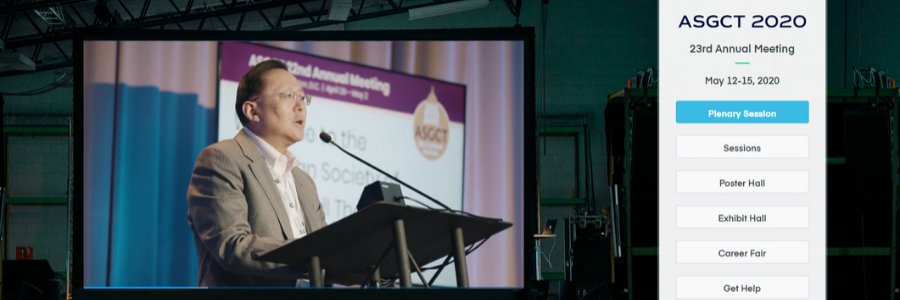The New Look of the Presidential Symposium
Kenji Rowel Lim - May 18, 2020
This year’s Presidential Symposium with its excellent line-up of speakers stood at the forefront of this mission, showing that high-impact, eye-opening, “new look” research can never be dampened by the conditions we are experiencing today.

“ASGCT is taking on a new look.”
These were the words of outgoing ASGCT President Dr. Guangping Gao as he unveiled the new Society logo at the start of the 23rd Annual Meeting Presidential Symposium on May 14. With its modern typeface, bright red color scheme, and strikingly fluid aesthetic, the new brand is a fitting representation of what ASGCT is: progressive, bold, and dynamic. Thinking about it now though, it seems that this “new look” meant something more than just a new logo. In fact, one could argue that it nicely embodied this year’s Presidential Symposium.
The distinguished Presidential Symposium is one of the high points of the Annual Meeting, usually with a keynote from a leading scientist in the field, as well as the presentation of the highest-rated abstracts submitted to the meeting. In his opening remarks for the Symposium, Gao was clear on why ASGCT decided to push through with the Annual Meeting despite the COVID-19 pandemic:
“Our mission to share the… advances in our field is too critically important to put on hold.” ASGCT indeed delivered this mission by going virtual, offering more than 6,200 registered attendees the opportunity to witness and/or share the best research in gene and cell therapy (and beyond) out there.
This year’s Presidential Symposium with its excellent line-up of speakers stood at the forefront of this mission, showing that high-impact, eye-opening, “new look” research can never be dampened by the conditions we are experiencing today.
Research at its Best
Multi-awarded researcher Dr. Feng Zhang, a core member of The Broad Institute, investigator at the McGovern Institute for Brain Research, and the James and Patricia Poitras Professor of Neuroscience at MIT, gave the keynote lecture for this year’s Presidential Symposium. Zhang is perhaps best known for his pioneering contributions to the development of CRISPR genome editing. Interestingly, a large portion of his talk focused on the use of CRISPR for diagnosing viral infections, especially COVID-19. It was fascinating to see CRISPR being used to combat the current pandemic.
The way Zhang described his team’s efforts to make their diagnostic test more accessible for public use was most inspiring. From reducing the amount of time it takes to extract RNA from human samples and minimizing the number of test steps from two to one just to decrease the chance of contamination, to even designing the test cost-effectively so that it works with a sous vide cooker, it goes to show how Zhang and his team tried every effort to adapt their science and address the practical demands of the real world. It was research at its best. Zhang mentioned how many more potential applications of CRISPR there could be, what with our increasing knowledge of microbial diversity. Exciting to say, the odyssey continues.
The Top Abstracts
Zhang’s talk was followed by four exemplary speakers, those with the highest-rated abstracts amongst everyone who submitted to the 23rd Annual Meeting. Here, the audience was treated to even more “new look” research:
- Dr. Peter Cook (Seattle Children’s Research Institute) showed how gene-edited regulatory T cells can be made specific to antigens in pancreatic islets, which would help more effectively treat type 1 diabetes.
- Dr. Blake Rust (Fred Hutchinson Cancer Research Center) talked about how a different immune cell-based approach, with CAR T cells, can be improved with antigen boosting for treating simian HIV viral rebound in nonhuman primates (NHPs) after interruption of antiretroviral therapy.
- Aisha AlJanahi (NIH) showed results from a longitudinal evaluation of CRISPR off-target effects in NHPs using a new method called error-corrected targeted sequencing.
- Faith Conroy (UMass Medical School) presented her work on how specific chemical modifications can create siRNAs that specifically target the silencing of mutant and not wild-type genes in a mouse model of Huntington’s disease.
Overall, these talks gave us a sense of how we can seek new ways to improve on existing technologies and obtain more effective therapies—a stark reminder of how science will always keep moving forward.
A Timely Closing Seminar
This year’s Presidential Symposium had a “new look” in one other aspect, and that wasthe addition of a highly relevant seminar on coronaviruses at the end, given by Dr. Paul McCray, professor of pediatrics (pulmonary medicine) and of microbiology and immunology at the University of Iowa. In his talk, McCray described the biology and human cell entry mechanisms of coronaviruses, and how this knowledge has helped drive the search for vaccines or treatments for COVID-19.
The placement of this session in the Presidential Symposium seemingly provided context to the meeting that we are not in a vacuum and that challenging times surround us. More importantly though, this talk highlighted the efforts of researchers worldwide who continue to work to try and put a stop to this pandemic.
We are in uncertain times, but it is exactly during these times when we should step up and do what we can to make it less so. The Presidential Symposium, the entire Annual Meeting, and ASGCT showed us how we can “take on a new look” in our circumstances, how science is still very much alive and progressing, and how we can all work together to keep it that way. The meeting may be over now but, as they say, let’s all “Keep Calm and Pipette On.”
Kenji Rowel Lim is a Ph.D. candidate in medical genetics at the University of Alberta, Canada, and a member of the ASGCT Communications Committee.
Related Articles